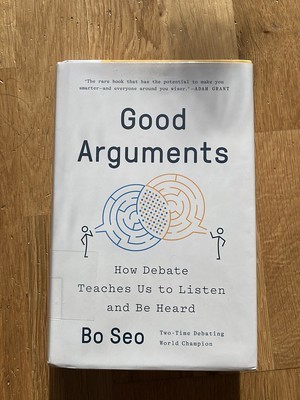Harvard大のIdeacastに出ていた人の話が面白そうだったのでNYPLで物理本を借りた。仕事で活かせるだろうか。
Bo Seo, two-time world champion debater, says we can learn to disagree in healthier, more effective ways that ultimately generate better outcomes for teams, customers, and shareholders

Introduction
著者は韓国からオーストラリアに引っ越してきた人。他の人と違うのがいやで議論をするのを避けていたが、ディベートに出会った。2回世界大会で優勝し、ハーバードのチームをコーチしたりもした。
Competitive debateはとてもフォーマルなやり方で競うまのだが、Everyday disagreementsにも役に立つ。
1 Topic: How to find the debate
What is disagreement?
3つのタイプのdisagreement:
- Factual disagreements. “X is Y”. “Lagos is a megacity”, “The crime rate in Paris was lower in 2014 than 2016”
- Normative disagreements. Subjective judgment about the world. “A should be considered B”, “We have good reasons that A is B”. “Lying is (should be considered) immoral.” “(We have good reasons to believe that) tomorrow will be better”
- Prescriptive disagreements. What we should do. “Our family should get a gym membership.” “The government should not impose limit on freedom of speech.”
著者が親戚との電話に出なかった事で父親が怒った。著者はちゃんと親戚といつも話していると反論した。そこで著者は"Wait, what are we arguing about?"と気づいた。お互いに親戚との絆を大切にすることは同じ考えなのである。そこから話していったら父親は著者が韓国のルーツを大切にしていないという態度を問題視していて、電話に出なかった事はそのサインに過ぎないとの事だった。

ただ一つの文でもその3種類のdisagreementsが混じっているものである。
We, as parents, should send our children to the local public school
この文の中から議論の的になる単語をいくつか見つけ出すのがtopic analysisという。
Topic analysisを学んだ著者らがディベートの文は
That developing countries should prioritize environmental sustainability over economic development
相手は「私たちは利益よりもサスティナビリティを重視すべき」「発展途上国が気候変動を最善させられるかもしれない」という点を話した。ここでチームメイトのNathanは「実は前の話者の論点に私達は合意します。私が問題提起したいのは気候変動のコストを払うのは誰なのかという点です。」と続けることができた。
Squirrelはディベート用語で最初に自分達が有利になる様に言葉を定義すること。フェアじゃない。相手の場所を無くすことになる。それよりも相手の考える言葉の定義を聞くことから始めるのがいい。
2 Argument: How to make a point
"死刑は正当化されない"というトピックに対して著者が意見を述べた後に相手のDebraさんが言ったこと:
“What you heard from the previous speaker were not arguments. Those were assertions. He never gave you any reasons to believe what he said. He just told you what he believed and used a lots of emotive words.
Argunentはmain claim、reason、evidenceからなる。
Conclusion: Bob is not a nice person.
Main claim: Bob is inconsiderate
Reason: because he is often cruel to others, including to his friends.
Evidence: At a dinner last Friday, he made hurtful comments about Sheryl’s job.
Two burden of proof. 話者は話している事が正しいこと、そしてそれが大切であることを信じてもらう必要がある。往々にして後者を満たす事は難しい。
ギリシャの歴史を学んでいる時にヒントがあった
- What is the point? (and because)
- Why is it true?
- When has it happened before (evidence)
- Who cares? (Importance)
3 Rebuttal: How to push back
オーストラリア代表のコーチBruce曰く相手が何か主張したらbullshit!と唱えてそこから相手の論理を崩す方法を考えろ、とのこと。
Right now, you are defaulting to agreement without really listening to the other side’s argument.
Main claimがTruthでないこと、Importantではないことを話す。例えば
- Conclusion: We should buy a new car.
- Main claim: because the old one is out of fasho .
に対して、
- Un-truth: the ild car is not, in fact, out of fashion.
- Un-importance: Even if it’s out of fashion, we should not buy a new car.
Truth rebuttal:
- factually incorrect (“No, people are not buying fewer hatchbacks these days”)
- lack evidence (“You haven’t given any reasons for me to believe that people’s taste are changing).
- Inconclusive (“Yes, that’s what Cars Daily says, but Motor Enthusiasts reckons something else”).
Importance rebuttal
- unimportant
- logical leap / misjudging the relevance (“Who says we have to drive a fashionable car?”)
- Outweighed by Better alternatives (Yes, we should drive a fashionable car, but we could do that by modifying the old one”)
相手の言ったことをさらに付け加えて補強する仕草は相手のことをきちんと聞いている("Now the opposition could have said ...")。
相手の言った事を打ち負かすことでは駄目で、counterclaimで締められるといい。
2013年の高校世界大会の決勝は“Turkey is better off joining EU”というトピック。最初はネガティブな面で議論していたが、著者はTurkeyの新しい国家のポジティブなビジョンを掲げる事で議論をリードして優勝できた。
4 Rhetoric: How to move people
ここまでは何を話すかを書いた。Rhetoricはどう伝えるか。
ネイティブスピーカーではない著者は慣用句や単語をとても頑張って覚えた。
tics (uhなどの言葉)を無くすトレーニング
- Ticsを数える。
- 文が滑らかに言えるようになるまで繰り返す。
大学の哲学科に興味を持ったが、説得力、話し方ではなく真実を知ることに重きを置いている。
ディベート大会で負けた。当時やっていたノート書きの練習を考えると、聴衆はノートを取っていなかった。説得力のある、カッコいい話し方に注力するあまり聴き手はノートを取れなかった? 修飾語に傾倒していた筆者はシンプルにするためのルールを作った。
ルール
- 意味のない繰り返しはしない。
- はっきり言いたくないかもしれないけど質問の形にしない。
- 問題がある時はどのstakeholderに害があるのか明言する。
5 Quiet: How to know when to disagree
速く話すこと(spread)に重きが置かれてしまっている。相手を説得させるのではなく威圧させるの重点が置かれてしまっているのではないか。
著者がpolicy debateとは別のparliament debateという簡易な言葉を使う作法もある。
対立意見で議論は始めるのは簡単だが終えるのは難しい。著者は反対意見を言う時に気をつけるリストを作った。
- Real. Misinterpretationとか対立意見がない時もある。“I don’t like your cousins”は良い対立意見の的ではない。
- Important. 意見の対立をする必要があるぐらい大切なトピックだろうか。
- Specific. Economyやfamily matterは抽象的すぎて時間内に進捗を作り出せない。
トピックを選ぶ議論では次のルールが作られた。
- A debate must not question the equal moral standing of persons. 北欧のひとはモラルがない、とかは駄目。
6 Self-defense: How to defeat a bully
トランプのように声が大きく、マナーが悪い話し手(bully)でも聴衆の投票では勝ってしまうことがある。
The Dodger. 議論の焦点ではないことを話そうとする。“Ad hominem attacks” は議論ではなく話し手に焦点を当てること("Bad for environment? You drive an SUV". Tu quoqueは別のものを取り上げること("Bad for environment? So are windmills").
The Twister. 相手が言った事を変えてそれを攻撃する。("Are you saying that communal safety should be sacrificed for individual freedom? This is typical libertarian argument”) 対応策はmisrepresentationを私的して元の議論に戻る事。
The Wrangler. 相手の意見を攻撃してばかりで自分のビジョンを言わない人。対応策は"So what do you believe?" "What would I have to convince you?"
The Lier. 嘘をつく人。それは嘘だ、というのは良くない手。仮定法で反論。

Trumpの勝利、思想の二極化で議論が生み出せる可能性を人々が諦めているのではないかという恐れを著者は感じている。
7 Education: How to raise citizens
8 Relationship: How to fight and stay together
“Getting to Yes”曰く
One can speak only after one has repeated what the other side has said to that person’s satisfaction
9 Technology: How to debate in the future
Redditのr/changemyview (CMV)は良い観察の場。
- Move fast. 返信する最初の2人は10番目の人より成功しやすい。
- Be honest. 一般的な話よりも自分の経験(I, you, us)を話した方が伝わりやすい。
- Don't be (too) responsive. 成功するのは新しい知見を提供するものが多い。逆に言えば相手の事を引用するような書き込みはあまり成功しない。
- Show receipt. 外部の調査結果を引用する。